By Rod Green
There can’t be many people who have never heard the name Nelson Mandela. His has become a household name, a name respected by everyone everywhere, from grandmothers to schoolchildren. Not so many people would recognize his other names, and he is a man who has been known by several names throughout his life.
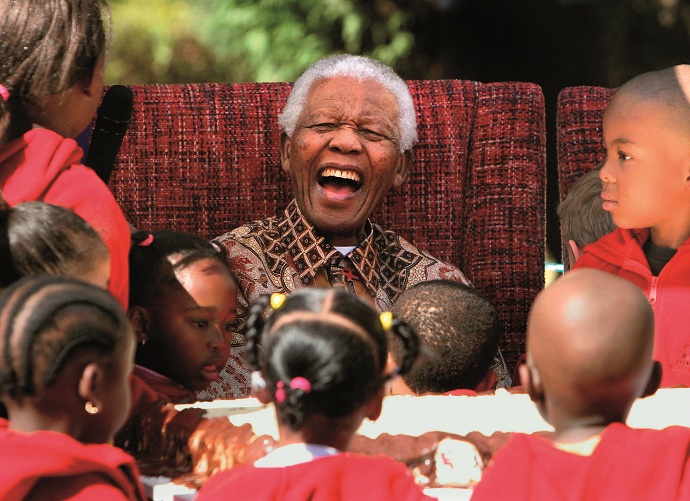
When he was on the run, with the ANC a banned organisation and Nelson one of its leaders, an arrest warrant hanging over his head, the South African press dubbed the elusive Mr Mandela “The Black Pimpernel.”
It was an image that he, and others working with him, did everything they could to perpetuate in order to ensure that everyone inside and outside South Africa knew that the ANC was still, in those turbulent times in the early 1960s, pursuing their fight for freedom. But that manufactured image quickly became superfluous. Nelson’s own name came to mean far more than any romanticised nickname.
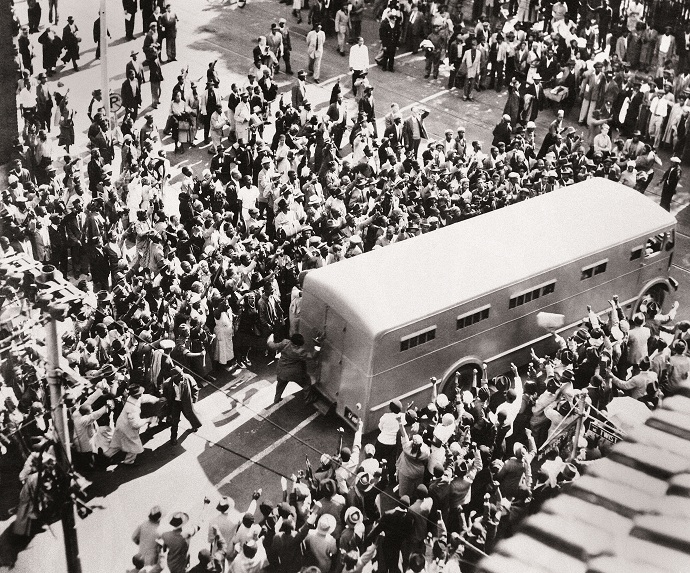
Supporters mob the police bus bringing the accused to trial at the Drill Hall in Johannesburg at the start of the treason trial in 1956
What, however, does Nelson Mandela’s real name actually mean? He was known by several names – Rolihlahla, the name given to him at birth; Nelson, the English name given to him when he first went to school; Dalibhunga, the name given to him when he went through his Xhosa tribal initiation ceremony; Madiba, the clan name used as a term of respect. To a certain degree the different names represent different periods in his life, and they certainly all have different meanings.
Rolihlahla translates into English as “shaking the tree branch,” which is a phrase taken to mean that anyone so named likes to cause a stir or is some kind of troublemaker. Nelson’s parents could not have known how prophetic their choice of birth name was but, while his father died when Nelson was still a young boy, his mother was there to see Nelson live up to the name Rolihlahla.
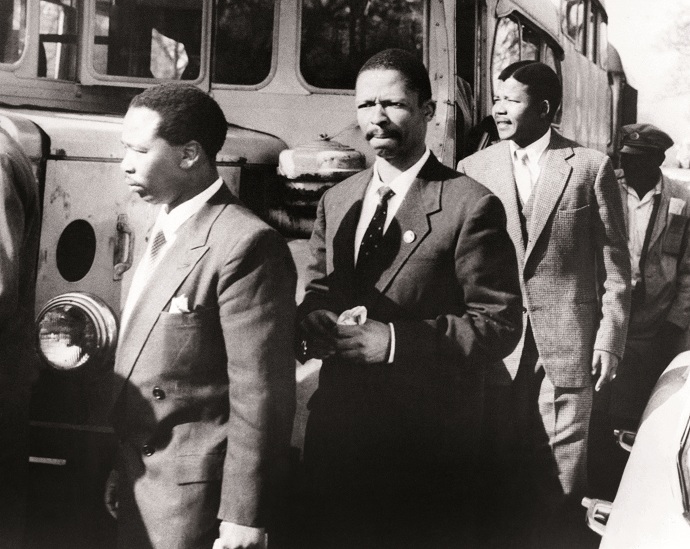
Treason trial defendants Robert Resha, Patrick Molaoa, and Nelson Mandela arrive in Pretoria by bus from Johannesburg.
Nelson was the name chosen for him by his schoolteacher, a traditional practice when African children first went to school. The teacher probably picked it on a whim, naming him after the English hero Horatio Lord Nelson. The actual name “Nelson” means “son of Neil” which you might not think at all significant to the life of the world’s most famous freedom fighter, until you learn that the name Neil means “champion.” Then, perhaps, the name suddenly seems a little more fitting.
Nelson’s Xhosa initiation, or circumcision name, Dalibhunga, was most definitely a deliberate choice. The “bhunga” in Dalibhunga is the name for a tribal council in the Transkei region where Nelson was brought up and the whole name is taken to mean “convener” or “founder” of the council, a name that reflects the role as adviser to the tribal chief which was once seen as Nelson’s destiny. It was a role, after all, that his father had also fulfilled.
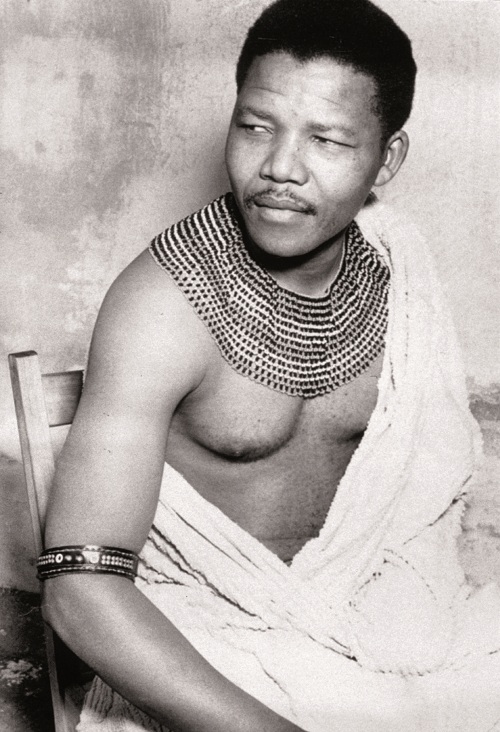
Nelson wearing traditional Xhosa costume, which he demanded to be able to wear in court.
The name Mandela, of course, has assumed a special meaning for people around the world. They associate Mandela with freedom, justice and equality. Mandela has become a symbol for civil rights, an icon of peace and the personification of wisdom. Mandela has become almost a religious figure, promoted to the level of sainthood by millions who would happily see him beatified, although, by his own admission, he falls well short of qualification for any form of canonization. He often said that he believed he had led a “thoroughly immoral life,” although he was always loath ever to elaborate on any details about his immorality. So what was he talking about?
There have been many rumors and allegations about him having had affairs during his first marriage, even hints at him having fathered an illegitimate child, but the towering events of his later life cast long and concealing shadows over such accusations. The public relations machine that created the accepted face of Nelson Mandela in order to keep the ANC cause and the fight for black emancipation in South Africa pricking the conscience of everyone who lived in freedom and comfort elsewhere in the world, was more than happy to leave his earlier life marooned in the past. Yet Nelson would never allow his failings to be swept completely under the carpet. “I am not a saint,” he said, “unless you think of a saint as a sinner who just keeps on trying.”
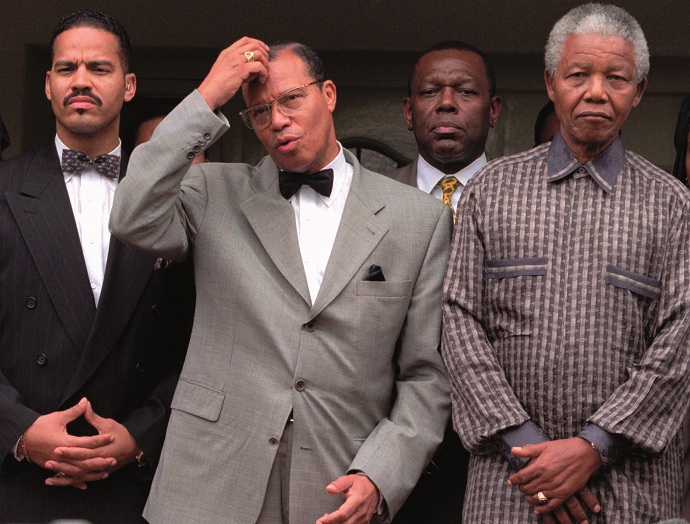
Nelson’s philosophy was to reject all forms of racism and sexism, and to accept all forms of religion, which led to a tense meeting with Louis Farrakhan, leader of the Nation of Islam in 1996.
Later controversies that flared up around claims of financial irregularities, foreign bank accounts and alleged tax avoidance still could not leave even the slightest scorch mark on Nelson’s shining armor. The overwhelming fact is that he devoted his entire life to serving his people, not to helping himself. Had he wanted to, he could have made a very comfortable living in South Africa and become a relatively wealthy man by pursuing his career as a lawyer. Instead, he chose to go to jail, not once, but a number of times, culminating in 27 years of incarceration. Even while in prison, he chose to continue to work on behalf of his people, on behalf of his country, putting even the meager comforts he was permitted in jail at risk. His life, in fact, could have been snuffed out by the authorities in any number of different ways any number of times over the years. It takes a special kind of man to live with that knowledge dogging every step he ever takes. He did not, however, regard the hardships he endured as unique or outstanding. When revisiting his Robben Island prison cell some years after his release, Nelson told reporters that, “There are many of my comrades who have sacrificed far more than I did.”
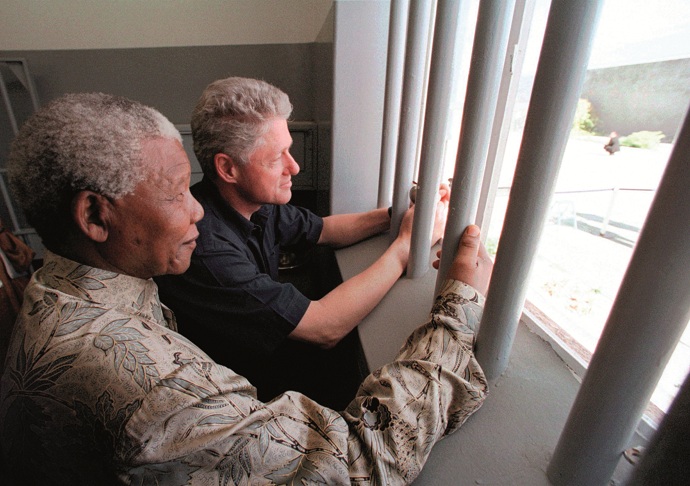
US President Bill Clinton with Nelson on a return visit to Robben Island in 1998.
To continue to serve the people of South Africa after he was released from prison, at an age when most men would long since have settled down to a quiet retirement, placing, as he put it when addressing his supporters on his release, “the remaining years of my life in your hands,” shows the extraordinary dedication that truly set Nelson apart from his contemporaries. There were others who suffered as he did, others who served prison terms alongside him, but there were none who could play all of the parts that he did – lawyer, campaigner, politician, strategist, military commander, negotiator, diplomat, president, statesman.
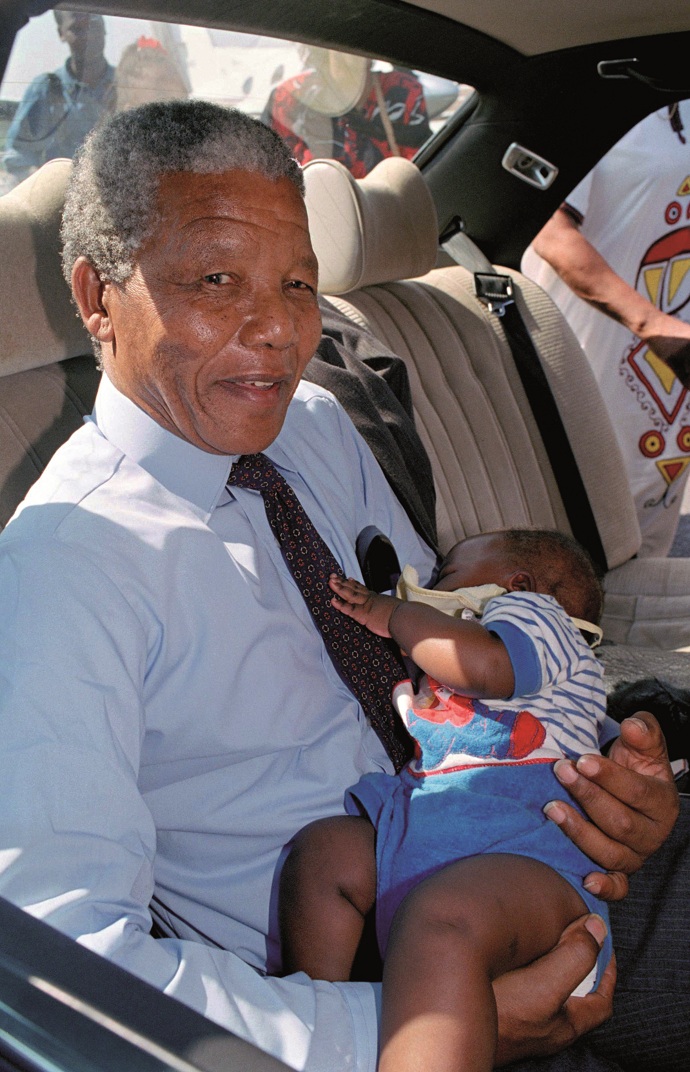
Nelson cradles his youngest grandchild, Bambata, in the back of his car the day after he was released.
The name Nelson Mandela would come to mean all of those things to millions of people all over the world and his immense achievements warrant him a place in history as one of the most influential men of the twentieth century.
Excerpt, photographs, and captions are from Mandela: The Life of Neslon Mandela and are shown here with permission from the publisher.
ROD GREEN is a New York Times bestselling author and former journalist. He has written or contributed to a wide range of books including his latest, Mandela.
